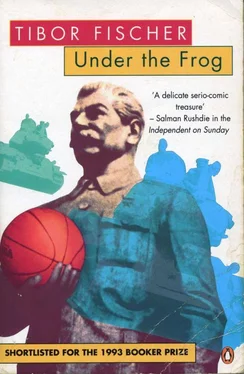Tibor Fischer - Under the Frog
Здесь есть возможность читать онлайн «Tibor Fischer - Under the Frog» весь текст электронной книги совершенно бесплатно (целиком полную версию без сокращений). В некоторых случаях можно слушать аудио, скачать через торрент в формате fb2 и присутствует краткое содержание. Жанр: Современная проза, на английском языке. Описание произведения, (предисловие) а так же отзывы посетителей доступны на портале библиотеки ЛибКат.
- Название:Under the Frog
- Автор:
- Жанр:
- Год:неизвестен
- ISBN:нет данных
- Рейтинг книги:3 / 5. Голосов: 1
-
Избранное:Добавить в избранное
- Отзывы:
-
Ваша оценка:
- 60
- 1
- 2
- 3
- 4
- 5
Under the Frog: краткое содержание, описание и аннотация
Предлагаем к чтению аннотацию, описание, краткое содержание или предисловие (зависит от того, что написал сам автор книги «Under the Frog»). Если вы не нашли необходимую информацию о книге — напишите в комментариях, мы постараемся отыскать её.
Shortlisted for Booker Prize 1993
Set in post-war Hungary between 1944 and 1956, this ferociously funny and bitterly sad story follows the fortunes of two young men in the pursuit of sex and the avoidance of work and army service. They survive the chaos of communism by becoming part of a travelling basketball team.
Under the Frog — читать онлайн бесплатно полную книгу (весь текст) целиком
Ниже представлен текст книги, разбитый по страницам. Система сохранения места последней прочитанной страницы, позволяет с удобством читать онлайн бесплатно книгу «Under the Frog», без необходимости каждый раз заново искать на чём Вы остановились. Поставьте закладку, и сможете в любой момент перейти на страницу, на которой закончили чтение.
Интервал:
Закладка:
Pataki had just found out about his speed one day and found it there whenever he needed it. If Gyuri didn’t run every day, he’d slow up and balloon; if he didn’t play ball every day, his edge would blunt but Pataki could wander onto court after a month in a Parisian restaurant and still be able to whizz down infallibly to dunk the ball in the basket. There had to be a good reason for Pataki to stir and training wasn’t one of them. ‘We’re not paid to train, we’re paid to win,’ was his reaction to Hepp’s supplications to hone his abilities. Hepp had no real choice but to put up with Pataki; he usually didn’t keep a close eye on him during training, so that his non-cooperation wouldn’t grate. On the other hand, Hepp had managed on one unforgettable occasion to persuade Pataki to run the 1500. Pataki must have had his mind on something else when Hepp had explained that the Locomotive athletics team was runnerless for the 1500 metres at an upcoming meet and had pleaded with Pataki to run it to avoid the ignominy of a no-show.
Gyuri was there on the day which introduced Pataki to effort. He could remember the uncomprehending shock that had appeared on Pataki’s face after the first lap and a half when it gradually became apparent to Pataki, that unlike shooting the length of a basketball court, the 1500 would involve that most daunting of things, labour. He came in fifth in a field of six, arriving at the finishing line with his customary collected features exploded into a morass of leering agony. After minutes of gasping for breath on the dearly-embraced ground, Pataki finally announced: ‘I thought I was going to die. These runners are out of their minds, how can they do this for a living? My track career is over.’
Gyuri had been very glad to witness Pataki stumble on a new world of experience, to see him dust off his will-power. Money, however, always got him going. The sprinters at the camp had already lost the more interesting portion of their worldly goods to Pataki as they always did when they challenged him. The sprinters, the 100 boys who trained with zealotic fervour, who stretched, bent, and twanged muscles for hours, who ran everywhere, lifted weights, ate carefully, and went to bed early and did nothing that didn’t further their aim of doing the 100 faster, couldn’t believe that Pataki could best them in a dash.
But he could, by challenging them to 50 metres. Sprinters who didn’t know Pataki joyfully stumped up the cash for the bet (and those who did know him stumped up petulantly) and then saw nothing but Pataki’s back. Over thirty metres he was so explosive, so swift, so straight out of the jungle, that no one could get close. By fifty, the professionals would have closed with him but they’d still be a sternum behind. The pattern, when Pataki, for amusement and not forints, had been dared to run the full hundred, was that before sixty the sprinters would have a nose ahead, by eighty they were clear and by the hundred Pataki could see their soles.
Rónai, an Olympic 100-metre bronze winner, was the one least able to come to grips with Pataki’s kick start. Year after year, he had been vanquished by Pataki at training sessions, at meets, on Margit Island and once inside the bar at the Opera. Fanatical, even by the whole-hearted standards of the sprinters, Rónai had the obsessive nature of a marathon runner. At the camps, he was a largely solitary figure who seemed to regard conversation as, at best, impinging on his training program or, at worst, blatant sabotage, and he could, to anyone not directly involved in the perfection of his leg movements, begrudge even a ‘good morning’. He would, even if waiting at a bus stop or in a queue for the cinema (not that he went very often), be bending and flexing muscles, or if refraining from using them would be plotting new techniques to lick them into shape.
Rónai was up before everyone else, in clement and inclement weather, trotting around, relishing the extra time he was putting in, that was putting him ahead of the others still in bed in Budapest and elsewhere, pushing himself and thinking about the next exertion. The world for Rónai was a conglomeration of various training possibilities that could enable him to load more ammunition into his legs in time for the ‘52 Olympics in Helsinki. Some of his mattress partners, miffed by his monomania, had let slip that when it came to bed, Rónai was less concerned with the merchant of pleasure knocking on his door, than in disciplining sets of muscles through a series of awkward and convoluted couplings that would last until he had counted out the required number of muscular contractions, the signal for a different constellation of brawn to come into service. ‘It’s so moving,’ one netball player recounted, ‘having gluteus maximus whispered in your ear.’
Rónai had lost heavily to Pataki, money, various edibles and a magnetic pocket-chess set he had obtained in London during the ’48 Olympics. He couldn’t leave Pataki alone; the very sight of Pataki lounging around made him twitch. He had come close to Pataki, very close, losing a number of runs by the breadth of a vest, and one even ended in a dead heat according to the adjudicators. But parity wasn’t good enough for Rónai. It wasn’t acceptable for him that a mere basketball player, who wasn’t even in the National team to boot, who was regularly to be found loafing around, gassing, playing cards, drinking Czech beer and being hunted by his coach, that such a ramshackle athlete could best a sprinter who hadn’t drunk a Czech beer since 1946. ‘Beer,’ he had pronounced publicly, ‘is for the weak. There are seven people around a campfire, they all put a hand into the flames. One by one, they pull back. The one who leaves his hand in the longest is the world champion.’ A man who never failed to exercise his ears before he went to sleep didn’t give up easily.
‘Quick, give me some cigarettes,’ Pataki would say when he saw Rónai approaching, lighting up two together to compose the veritable picture of the prodigal sportsman. Two weeks into the camp, Rónai had lost all his money and any objects of value, including a pair of remarkable German toe-nail clippers and a less remarkable phial of Bulgarian rose-water, though the judging of the races had been made more difficult, as after the first few defeats Rónai insisted on running after dark when no one else was likely to be about. It was always tight, Rónai at Pataki’s heels like a fleshed-out shadow, but the nipple-length losses were an awful gulf to Rónai, an abyss that became progressively more uncrossable.
One night Gyuri and Pataki entered the camp canteen to find Rónai entombed by empty Czech beer bottles, shouting out as if to the human race: ‘It’s too unfair. There’s no point. It’s all fixed.’ It had never occurred to Rónai that there were people who couldn’t be bothered to put a hand into the fire. It made Gyuri feel a lot better, and perhaps Rónai too, though he still kept losing to Pataki.
Predestination was not something to which Hepp subscribed. He was out to humble and humiliate Hármati’s National team and he had a suitcase full of plans to bring this about. ‘You’re probably too young to understand this,’ said Hepp addressing the team, ‘but the real tragedy of life, the most appalling fact you will have to face in this existence is that there is no substitute for hard work’ – and flourishing rolls of documents – ‘and using the right plan.’
The sight of Hepp threatening a Stalin shift of training threw a panic through the team – they had been counting on a month of sunbathing and exploring the plentiful cuisine prepared for the sportsmen and women representing the Hungarian nation. Pataki took Hepp aside: ‘Look, we get the message: you want to do the National boys?’ ‘Yes,’ conceded Hepp. ‘Okay, here’s the proposition,’ urged Pataki, ‘We’ll train hard, but, and the boys have asked me to approach you on their behalf, but if we can forego the above-the-call-of-duty stuff, we guarantee, I guarantee that at the last match of the camp, at the display when all the big cheeses are there, I guarantee that we’ll beat them. But, believe me, the team will fray if we overdo it. Remember what the water-polo player said at the brothel after he paid for eight girls, but only employed five, “This is ridiculous. I managed all eight this morning.’”
Читать дальшеИнтервал:
Закладка:
Похожие книги на «Under the Frog»
Представляем Вашему вниманию похожие книги на «Under the Frog» списком для выбора. Мы отобрали схожую по названию и смыслу литературу в надежде предоставить читателям больше вариантов отыскать новые, интересные, ещё непрочитанные произведения.
Обсуждение, отзывы о книге «Under the Frog» и просто собственные мнения читателей. Оставьте ваши комментарии, напишите, что Вы думаете о произведении, его смысле или главных героях. Укажите что конкретно понравилось, а что нет, и почему Вы так считаете.












